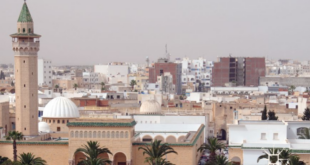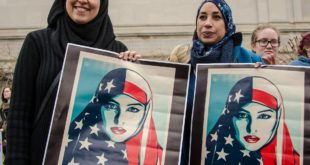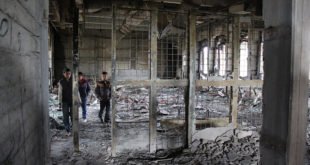S. Abdallah Schleifer interviews Ibrahim Helal, editor-in-chief, and Amr El-Kahky, correspondent.
TBS: Do you consider the latest Gulf War as still another turning point for Al Jazeera, in the sense that the Afghan War was when Al Jazeera established itself as a global rather than only a regional player in satellite TV journalism?
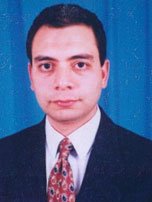 Helal: Yes, it was a turning point. This time around we faced global competition, not just Al Arabiya or Abu Dhabi. We were out there competing with BBC World, CNN, everybody. Everybody was out there. Everybody theoretically had fair access on the ground. But in fact we didn't get treated as fairly as Abu Dhabi and the Western channels.
Helal: Yes, it was a turning point. This time around we faced global competition, not just Al Arabiya or Abu Dhabi. We were out there competing with BBC World, CNN, everybody. Everybody was out there. Everybody theoretically had fair access on the ground. But in fact we didn't get treated as fairly as Abu Dhabi and the Western channels.
We did our best to be everywhere in the north of Iraq, with both the Kurds and Saddam's forces, and in the south we had two people in Basra. All in all, on both sides we managed to get eight people accredited. One cameraman and a reporter were accredited with the Coalition through Kuwait with great difficulty, and only two or three days after the war began. We got eight slots from the Pentagon well in advance of the war but we couldn't fill them because we couldn't get accreditation from the Kuwaiti or Bahraini authorities, which we had to have before the Coalition would embed.
Amr was the only Al Jazeera reporter we were able to get accredited and embedded, and we had a previously accredited cameraman, who had been accredited by the Kuwaiti authorities. With his existing Kuwaiti press card he was able to function in Kuwait and get himself embedded there.
In the end, we managed to get more reporters and more coverage than others, because we had reporters on both sides, and we had many points of view on air: we had the Kurds' point of view—two correspondents reporting from Kurdish areas—and we were able to convince Saddam's Basra authorities to let us report live audio from Basra since our uplink wasn't working from there, and we also linked up with the British forces and we were able to break the story of the British takeover of the city.
In Tikrit, which was the last city to be occupied, we were there with our reporter and our satellite uplink—the DV Onsight (a transmission device superior to the video phone and much more mobile than, if not quite as good as, an SNG). One day before the Americans came in, we had local people appealing via Al Jazeera to the Americans not to storm the city, that the city was open and would not resist. And indeed that's what happened, no real fighting, and we had live footage of American forces moving in. And of course we were lucky enough to have exclusive pictures of American and British casualties (dead and captured wounded) which we got from the Iraqi side and which outraged people.
Other highlights? There was the day when American planes bombed Ansar al Islam— in a very, very remote area of northern Iraq and we were the only ones there. Our reporter Waddah Khanfar (see Stop Press: Al Jazeera Gets New Manager) had been there even before the war, establishing contacts with the Ansar as well as the two major Kurdish groups and some of the smaller Islamist ones. That was well before the attack. A few hours after the attack, he was back in the area, transmitting his reports with interviews.
We had reporters in Basra when it was bombarded. The British shelled a complex of food warehouses by mistake, which Amr shot, and he got us the famous interview with the commander of the 55th Division, who, according to Coalition claims, had surrendered, which he hadn't.
And then there was Amr, who made it clear, following the first Coalition claim they had taken Um Kasr, that there are two parts to Um Kasr.
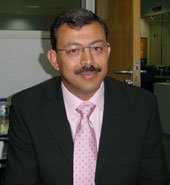
Arab reporters were assigned to support units, which the Americans did because they wanted Arab media to focus on humanitarian aid. I did do humanitarian stories but I did get access to the battle front, because the support unit I was assigned to was attacked. So invariably we would get some battlefield coverage.
TBS: Humanitarian stories are important. Too often they get ignored for sensational stories-violence or when things go wrong. But in fairness the coalition should have given you two embedded positions one at the front, and one with support units.
Hilal: Precisely. That's what we asked for. As it was, we embedded another one of our correspondents by having him accredited with another channel but transmitting for us.
El-Kahky: The other horrible thing was that all the Western reporters—CNN, BBC, APTN—got a briefing in the morning with the commanding officer of the 15th Marine Expeditionary Unit, the unit I was with. Al Jazeera was never invited and when I complained the Marines' media officer said, "You are a channel with a reputation" and I said, "Either I am fully embedded or as of today I disembed and will go on all TV channels to say what happened. So I expect a decision in ten minutes." And they came back in five minutes and said, "Okay. You are a channel with a good reputation and you will have the same access as all other channels." But then they canceled the morning briefing. Instead it happened on a one-on-one basis. My colleagues in the global press were very supportive. Reuters, BBC, AP Wire Service, and others were very supportive of me but the amount of briefing made available to me only increased by 10 percent. And it was very obvious to me when I talked to Coalition troops they generally had a very biased attitude towards Al Jazeera.
TBS: But Centcom (Coalition Central Command HQ) in Doha seemed to go out of its way be fair to Al Jazeera, even to woo Al Jazeera, always calling on Al Jazeera at press briefings.
El-Kahky: But the important stories weren't coming out of Centcom. Whatever was the original idea of embedding was not enforced systematically from the top and the initiative was left to ground commanders who could decide how to handle us and if they had prejudice in contrast to Centcom, then we suffered.
I was always talking face to face with the ground troops—commissioned and non commissioned officers and the ranks—and they couldn't believe Al Jazeera was pan-Arab: they thought of us as fundamentalist and maybe expected us to look like Bin Ladin. Instead, they got someone speaking more than adequate English and explaining to them about Al Jazeera and in every single conversation I ended up with the feeling that they really wanted to have an opportunity to get to better understand who we were, where we were coming from.
We talked and shared. I had the coffee and the kettle, they had the sugar and cigarettes, and each day we would talk and they would realize who we were. Really, the day I finally disembedded (April 9, with the fall of Baghdad) should have been the first day of my campaign as an embedded correspondent. By that time we were better understood.
The Free Iraqi Forces (the FIF, Chalabi's militia) were living in the same camp and one day they heard me reporting about a sniper firing at a water purification unit and they threatened me saying that the FIF will kill you. This was after three days of working in Al Nasiriya. I was moving about freely and I went out among the citizens of Al Nasiriya and some people would threaten me but the people who had seen our reports and my reports in particular (because many had hidden satellite dishes) would come and defend Al Jazeera and that sort of support made me feel better. But I left the unit because of the threats. I had suggested to the Coalition command that I be moved to another unit—but this was rejected categorically—or be given guarantees as to my safety and the ability to do my job; I wasn't satisfied by the response, so I returned to Kuwait hoping to be re-embedded with another unit. However, when I got there I was told there weren't any more vacant slots. So I came back to Doha. I returned to Baghdad on August 27th and I returned again to Doha on October 3rd.
TBS: What about the reportedly captured document that Chalabi's people say implicated some of Al Jazeera's staff as being on Saddam's payroll?
El-Kahky: Someone came to our office in Baghdad with the so-called Iraqi Information Ministry document supposedly signed by Al Sahhaf and the document said "Ministry of Culture And Information," whereas the two ministries had been split earlier on, and it was signed "Muhammad Al Sahhaf," whereas he always signed his name Muhammad Said Al Sahhaf, and it said "Foreign Relations Department" when the real name is Foreign Media [Department], and the form of the signature was obviously a forgery -when I compared that signature to a sample Al Sahhaf's signatures on letters of his we had acquired, it was not the same signature. So on all counts it was a forgery. Remember that during the 1991 uprising and again during the looting that followed the collapse of the government in this war, lots of official seals and stationary were seized and right now forgery is a big business in Baghdad.
TBS: How do you answer the accusation, most recently by the Interim Governing Council, that your reporting from Iraq is biased?
El-Kahky: If people would just watch and listen to Al Jazeera instead of allowing their prejudices to dictate what they hear, they would see us as unbiased.
TBS: I get the feeling talking to correspondents going in and out of Iraq that there is more to the story than the ongoing violence in Baghdad and the Sunni Triangle—that large areas of the country are relatively quiet, peaceful, and humming along with development projects. But just as "no news is good news," conversely, in our business, too often good news is no news. And even a great paper like the International Herald Tribune will acknowledge in very rare "good news" stories, that this aspect of the occupation is largely ignored, and we know in the case of the Tribune it's not reporters with ideological or anti-American agendas, but it's because conflict, confrontation, and high-level politics drive the news.
El-Kahky: Well I did apply, on this last tour in Baghdad, to do reconstruction stories. But Al Jazeera doesn't get access that easily. I wanted to do stories on reconstruction and we would apply through the CPA—the Coalition Provisional Authority—so we would apply ten days in advance, and they'd get around to contacting us too late, past our ten-day deadline, and even when the idea of our coverage was welcomed by the individual involved, like interviewing the British envoy, nevertheless we were put off.
TBS: What about the Interim Governing Council, which barred you from covering their activities for two weeks.
El-Kahky: Look, they objected to Al Jazeera referring to them as US-imposed, but when I show the governing council clippings from the Washington Post and the New York Times in which the Post and the Times describe the Governing Council as "US-imposed," the Council says "Yes, we know that, but we don't care about the impact of that description in the West." They say to us, "We care about your audience, the Arab audience and how it is shaped."
 Arab Media & Society The Arab Media Hub
Arab Media & Society The Arab Media Hub
